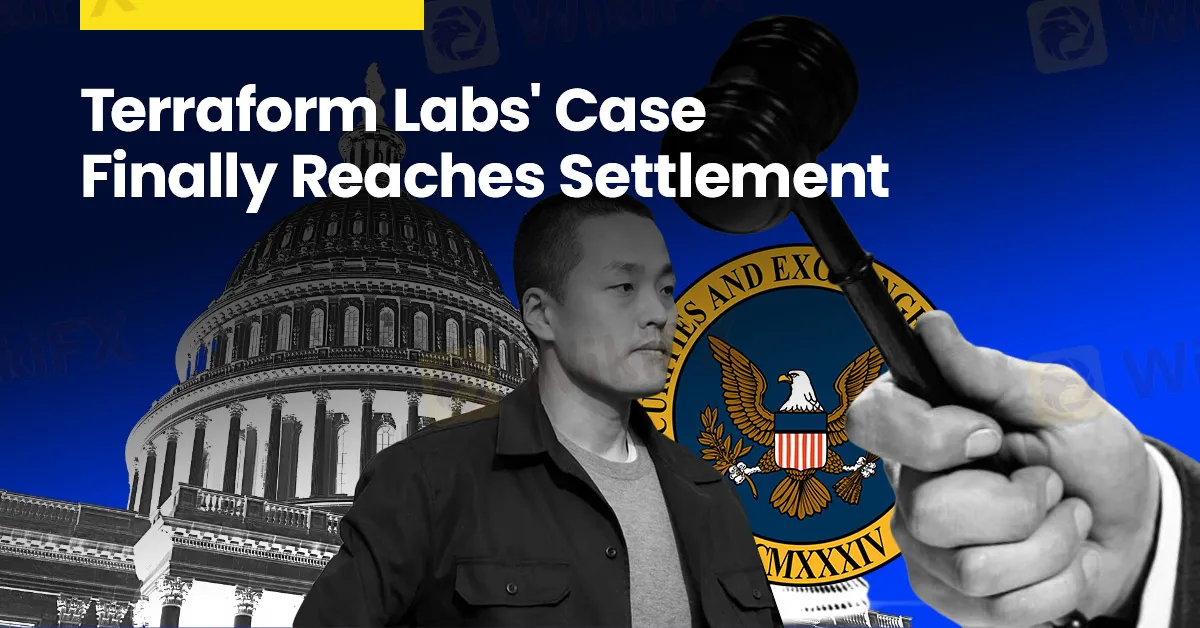简体中文
繁體中文
English
Pусский
日本語
ภาษาไทย
Tiếng Việt
Bahasa Indonesia
Español
हिन्दी
Filippiiniläinen
Français
Deutsch
Português
Türkçe
한국어
العربية
Terraform Labs' Case Finally Reaches Settlement
Abstract:Terraform Labs and its founder, Do Kwon, have settled with the US Securities and Exchange Commission (SEC) following accusations of fraud linked to the collapse of the stablecoin TerraUSD. This agreement, disclosed on a court website, follows an April jury finding that held Kwon and Terraform Labs responsible for civil fraud charges.

Terraform Labs and its founder, Do Kwon, have reached a settlement in principle with the U.S. Securities and Exchange Commission (SEC) to resolve civil fraud charges stemming from the collapse of the stablecoin TerraUSD (UST), according to a court filing. This follows an April jury verdict finding Kwon and Terraform Labs liable.
The SEC had alleged that Kwon and Terraform misled investors about UST's stability, a crypto asset designed to maintain a 1:1 peg with the US dollar. Additionally, the SEC claimed Terraform misrepresented the use of its blockchain technology in a popular Korean mobile payment app.
The settlement terms remain confidential, but it signifies a significant development in the ongoing legal saga surrounding Terraform Labs, Do Kwon, and the SEC. U.S. District Judge Jed Rakoff has requested both parties submit supporting documentation by June 12, 2024.
Previously, the SEC sought substantial penalties, including the disgorgement of $5.3 billion in alleged ill-gotten gains from UST sales, hefty fines, and a ban on Kwon and Terraform Labs from participating in the crypto securities market.

The May 2022 implosion of UST and its associated token, Luna, triggered a major downturn in cryptocurrency markets, inflicting an estimated $40 billion in investor losses. While the SEC charges have been settled, Kwon still faces criminal accusations in both the US and South Korea. He maintains his innocence.
A recent development has emerged in Kwon's extradition case. Montenegro's Court of Appeal has remanded the case back to the High Court for retrial, following concerns raised by Kwon's legal team regarding the validity of the initial ruling.
The Court of Appeal accepted Kwon's legal arguments, overturning the High Court's April 8, 2024 decision that authorized his extradition. The initial ruling drew criticism for lacking concrete evidence and sufficient reasoning. In the retrial, the High Court must ensure Kwon's extradition consent is voluntary, informed, and irrevocable.
The US has filed eight charges against Kwon and expressed willingness to proceed with his prosecution in absentia. Following the 2022 TerraUSD/Luna collapse that wiped out nearly $37 billion in crypto market value and triggered numerous company failures, Kwon initially vanished from public view before his arrest in Montenegro.

Disclaimer:
The views in this article only represent the author's personal views, and do not constitute investment advice on this platform. This platform does not guarantee the accuracy, completeness and timeliness of the information in the article, and will not be liable for any loss caused by the use of or reliance on the information in the article.
Read more

Bybit Shuts Down NFT Marketplace Amid Crypto Market Downturn
Bybit announces the closure of its NFT marketplace, citing efforts to streamline offerings. Discover the latest trends in the declining NFT market and its shift to utility-based growth.

Galaxy Digital Settles $200M in Luna Token Manipulation Case
Galaxy Digital pays $200M to settle Luna token manipulation probe by NY regulators, linked to TerraUSD’s 2022 crash, impacting crypto market stability.

Vanuatu Passes VASP Act to Regulate Crypto and Digital Assets
Vanuatu's new VASP Act regulates crypto businesses, enforcing strict licensing, AML/CFT compliance, and investor protections.

Why the SEC Rejected the First U.S. Bank-Issued Stablecoin
The SEC rejected the first U.S. bank-issued stablecoin, citing regulatory concerns. This decision highlights the ongoing challenges in crypto asset classification and oversight.
WikiFX Broker
Latest News
TradingView Brings Live Market Charts to Telegram Users with New Mini App
Trump tariffs: How will India navigate a world on the brink of a trade war?
Interactive Brokers Launches Forecast Contracts in Canada for Market Predictions
Authorities Alert: MAS Impersonation Scam Hits Singapore
Stocks fall again as Trump tariff jitters continue
INFINOX Partners with Acelerador Racing for Porsche Cup Brazil 2025
Regulatory Failures Lead to $150,000 Fine for Thurston Springer
April Forex Trends: EUR/USD, GBP/USD, USD/JPY, AUD/USD, USD/CAD Insights
March Oil Production Declines: How Is the Market Reacting?
Georgia Man Charged in Danbury Kidnapping and Crypto Extortion Plot
Currency Calculator







